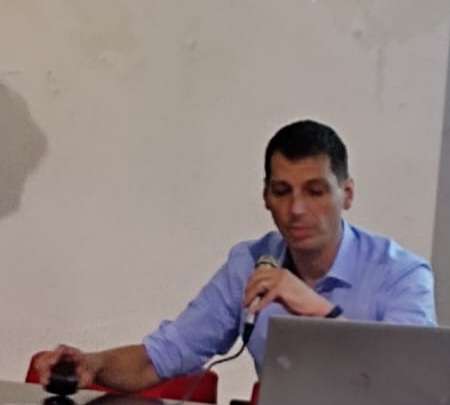Studying at the University of Verona
Here you can find information on the organisational aspects of the Programme, lecture timetables, learning activities and useful contact details for your time at the University, from enrolment to graduation.
Academic calendar
The academic calendar shows the deadlines and scheduled events that are relevant to students, teaching and technical-administrative staff of the University. Public holidays and University closures are also indicated. The academic year normally begins on 1 October each year and ends on 30 September of the following year.
Course calendar
The Academic Calendar sets out the degree programme lecture and exam timetables, as well as the relevant university closure dates..
| Period | From | To |
|---|---|---|
| CuCi IA | Sep 21, 2020 | Oct 31, 2020 |
| CuCi IB | Nov 9, 2020 | Jan 9, 2021 |
| CuCi IIA | Feb 15, 2021 | Apr 1, 2021 |
| CuCi IIB | Apr 14, 2021 | May 29, 2021 |
| Session | From | To |
|---|---|---|
| sessione d'esame invernale CuCi | Jan 11, 2021 | Feb 13, 2021 |
| sessione d'esame estiva CuCi | Jun 7, 2021 | Jul 24, 2021 |
| sessione d'esame autunnale CuCi | Aug 23, 2021 | Sep 18, 2021 |
| Session | From | To |
|---|---|---|
| sessione di laurea invernale 19-20 | Apr 7, 2021 | Apr 13, 2021 |
| sessione di laurea estiva 20-21 | Jul 5, 2021 | Jul 10, 2021 |
| Sessione autunnale di laurea a.a. 2020/21 | Nov 8, 2021 | Nov 13, 2021 |
| Sessione straordinaria di laurea a.a. 2020/21 | Mar 28, 2022 | Apr 2, 2022 |
| Period | From | To |
|---|---|---|
| Festa di Ognissanti | Nov 1, 2020 | Nov 1, 2020 |
| Chiusura Ateneo ponte Immacolata | Dec 7, 2020 | Dec 7, 2020 |
| Festa dell'Immacolata | Dec 8, 2020 | Dec 8, 2020 |
| Vacanze di Natale | Dec 24, 2020 | Jan 6, 2021 |
| Vacanze di Pasqua | Apr 2, 2021 | Apr 6, 2021 |
| Festa della liberazione | Apr 25, 2021 | Apr 25, 2021 |
| Festa del lavoro | May 1, 2021 | May 1, 2021 |
| Festa del Santo Patrono | May 21, 2021 | May 21, 2021 |
| Sospensione delle lezioni | May 22, 2021 | May 22, 2021 |
| Festa della Repubblica | Jun 2, 2021 | Jun 2, 2021 |
| Vacanze estive | Aug 9, 2021 | Aug 15, 2021 |
Exam calendar
Exam dates and rounds are managed by the relevant Culture and Civilisation Teaching and Student Services Unit.
To view all the exam sessions available, please use the Exam dashboard on ESSE3.
If you forgot your login details or have problems logging in, please contact the relevant IT HelpDesk, or check the login details recovery web page.
Should you have any doubts or questions, please check the Enrollment FAQs
Academic staff
 bernard.aikema@univr.it (per tutti), aikemaforstudents@gmail.com (per studenti)
bernard.aikema@univr.it (per tutti), aikemaforstudents@gmail.com (per studenti)
 +39 045802 8197
+39 045802 8197

Bassetti Massimiliano
 massimiliano.bassetti@univr.it
massimiliano.bassetti@univr.it
 045802 8376
045802 8376
 silvana.bianchi@univr.it
silvana.bianchi@univr.it
 rossana.cotroneo@univr.it
rossana.cotroneo@univr.it
 stefania.cretella@univr.it
stefania.cretella@univr.it
 marco.dallavalle@univr.it
marco.dallavalle@univr.it
 vincenzo.giannotti@univr.it
vincenzo.giannotti@univr.it
 piergiovanna.grossi@univr.it
piergiovanna.grossi@univr.it
 elisa.lerco@univr.it
elisa.lerco@univr.it
 francesco.lupi@univr.it
francesco.lupi@univr.it

Mastrocinque Attilio
 attilio.mastrocinque@univr.it
attilio.mastrocinque@univr.it
 +39 045802 8386
+39 045802 8386
 marco.menato@univr.it
marco.menato@univr.it
 marta.minazzato@univr.it
marta.minazzato@univr.it
 andrea.piasentini@univr.it
andrea.piasentini@univr.it
 lucasimone.rizzo@univr.it / lucasimone.rizzo@unipd.it
lucasimone.rizzo@univr.it / lucasimone.rizzo@unipd.it
 alberto.scandola@univr.it
alberto.scandola@univr.it
 carlo.vannini@accademiabelleartiverona.it
carlo.vannini@accademiabelleartiverona.it
 paola.venturelli@univr.it
paola.venturelli@univr.it
 sabrina.zago@univr.it
sabrina.zago@univr.it
Study Plan
The Study Plan includes all modules, teaching and learning activities that each student will need to undertake during their time at the University.
Please select your Study Plan based on your enrollment year.
1° Year
| Modules | Credits | TAF | SSD |
|---|
1 module to be chosen among the following2° Year activated in the A.Y. 2021/2022
| Modules | Credits | TAF | SSD |
|---|
1 module to be chosen among the following2 modules to be chosen among the following3 modules to be chosen among the following3° Year activated in the A.Y. 2022/2023
| Modules | Credits | TAF | SSD |
|---|
1 module to be chosen among the following1 module to be chosen among the following3 modules to be chosen among the following| Modules | Credits | TAF | SSD |
|---|
1 module to be chosen among the following| Modules | Credits | TAF | SSD |
|---|
1 module to be chosen among the following2 modules to be chosen among the following3 modules to be chosen among the following| Modules | Credits | TAF | SSD |
|---|
1 module to be chosen among the following1 module to be chosen among the following3 modules to be chosen among the following| Modules | Credits | TAF | SSD |
|---|
Legend | Type of training activity (TTA)
TAF (Type of Educational Activity) All courses and activities are classified into different types of educational activities, indicated by a letter.
Italian Literature BC (i+p) (2020/2021)
Teaching code
4S02112
Teacher
Coordinator
Credits
12
Language
Italian
Scientific Disciplinary Sector (SSD)
L-FIL-LET/10 - ITALIAN LITERATURE
Period
CuCi IA, CuCi IB
Learning outcomes
" The course aims to provide students with an exhaustive picture of the Italian literary tradition (texts, contexts, methods, themes, problems, forms and contents) from the origins to the Unification of Italy (introductory part) and to deepen students' knowledge of the Italian literature, with particular reference to a precise phase of its historical development, through the direct analysis of the work of a particularly representative author of that specific period and culture (advanced part). "
Program
• PARTE INTRODUTTIVA: the main phases and authors of the italian literary tradition from the Origini to the Unità, with analysis of exemplary texts
• PARTE PROGREDITA: From the first book of Letters of Aretino to the Ultime lettere di Jacopo Ortis.
PARTE INTRODUTTIVA:
1. G. TELLINI, Letteratura italiana. Un metodo di studio, Firenze, Le Monnier Università, 2011, pp. 3-336 (le prime due sezioni: Dalle Origini al Rinascimento e Dalla nuova scienza all’epica risorgimentale)
Anthology of texts by the major authors of our literary tradition. The anthology will be placed on the University e-learning platform. The texts to be analyzed will be indicated by the teacher during the course.
Non-attending students must present a written and detailed list of the selected pieces, under penalty of exclusion from the exam.
-DANTE ALIGHIERI, Divina Commedia: cinque canti della Divina Commedia tra quelli in antologia
-FRANCESCO PETRARCA, Canzoniere: cinque componimenti, di cui almeno una canzone
-GIOVANNI BOCCACCIO, Decameron: cinque novelle
-NICOLÒ MACHIAVELLI: due capitoli del Principe e una scena della Mandragola
-LUDOVICO ARIOSTO, Orlando furioso: uno dei canti in antologia
-TORQUATO TASSO, Gerusalemme liberata: uno dei canti in antologia
-CARLO GOLDONI: un atto a scelta di una commedia
-GIUSEPPE PARINI: un’ode o un passo del Giorno
-VITTORIO ALFIERI: un atto della Mirra o un passo antologico della Vita
-UGO FOSCOLO: due sonetti o una sezione dei Sepolcri
-GIACOMO LEOPARDI: tre canti e una delle Operette morali
-ALESSANDRO MANZONI: un componimento poetico o un passo del romanzo.
| Author | Title | Publishing house | Year | ISBN | Notes |
|---|---|---|---|---|---|
| Fabio Forner | Scrivere lettere nel 18. secolo, precettistica, prassi e letteratura. Premessa di Amedeo Quondam. Seconda edizione, ampliata e rivista (Edizione 2) | Verona, QuiEdit, | 2020 | 978-88-6464-582-7 |
Examination Methods
The assessment of the preparation will take place by oral examination, intended to verify above all the direct knowledge and the ability to analyze the texts. It is scheduled, if health situation will be good, an in itinere test for attending students that will focus on the first part of the course. With regard to this first part, the student will be required to know the main lines of Italian literary history from its origins to the nineteenth century. The student will have to study with particular attention the authors and texts presented in the anthology. The first part of the exam (substituted by the in itinere test for attending students) is oral; the first question will concern the biography of an author, the second will ask to illustrate the texts chosen by the student.
The program of the first part of the exam is the same for both attending students and non-attending students.
The second part of the exam is oral and will check the learning level of the second part of the course. The student taking the attending program will need to know the biography and the works of the authors presented in class; the student must also be able to introduce, paraphrase and comment the texts presented in class.
A program will be prepared for the Non-attending students.
Students may decide to support the two parts of the exam in the same appeal, or in two separate appeals.
The vote is expressed in 30/30.
Type D and Type F activities
| years | Modules | TAF | Teacher |
|---|---|---|---|
| 1° 2° 3° | Castelvecchio Lectures (City Art Museums) | F |
Alessandra Zamperini
(Coordinator)
|
| 1° 2° 3° | C.T.G. Lectures | F |
Alessandra Zamperini
(Coordinator)
|
| 1° 2° 3° | Giornata mondiale della poesia | F |
Arnaldo Soldani
(Coordinator)
|
| 1° 2° 3° | Giovedì' culturali dell'ISSR I ciclo | F |
Tiziana Franco
(Coordinator)
|
| 1° 2° 3° | The Unesco World Heritage Sites | F |
Silvana Bianchi
(Coordinator)
|
| 1° 2° 3° | Il testo en abyme: rappresentazioni della scrittura nell’Europa romantica - Convegno internazionale del CRIER - 5-6 novembre 2020 | F |
Corrado Viola
(Coordinator)
|
| 1° 2° 3° | Orientaday | F |
Tiziana Franco
(Coordinator)
|
| years | Modules | TAF | Teacher |
|---|---|---|---|
| 1° 2° 3° | Castelvecchio Lectures (City Art Museums) | F |
Alessandra Zamperini
(Coordinator)
|
| 1° 2° 3° | Convegno su carlo gozzi nel terzo centenario della nascita | F |
Nicola Pasqualicchio
(Coordinator)
|
| 1° 2° 3° | C.T.G. Lectures | F |
Alessandra Zamperini
(Coordinator)
|
| 1° 2° 3° | Giovedì' culturali dell'ISSR I ciclo | F |
Tiziana Franco
(Coordinator)
|
| 1° 2° 3° | How to write your dissertation | F |
Alessandro Arcangeli
(Coordinator)
|
| years | Modules | TAF | Teacher | |
|---|---|---|---|---|
| 1° | Introduction to the study of decorative arts | F |
Valerio Terraroli
(Coordinator)
|
|
| 1° 2° 3° | Attivita' FAI | F | Not yet assigned | |
| 1° 2° 3° | Practical exercises for the recognition of works of art | - |
Enrico Dal Pozzolo
(Coordinator)
|
|
Career prospects
Module/Programme news
News for students
There you will find information, resources and services useful during your time at the University (Student’s exam record, your study plan on ESSE3, Distance Learning courses, university email account, office forms, administrative procedures, etc.). You can log into MyUnivr with your GIA login details: only in this way will you be able to receive notification of all the notices from your teachers and your secretariat via email and soon also via the Univr app.
Graduation
List of theses and work experience proposals
| theses proposals | Research area |
|---|---|
| Ambiti di tesi | Art & Architecture - Art & Architecture |
| Stage | Research area |
|---|---|
| Lavorare in archivio | Various topics |












































